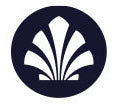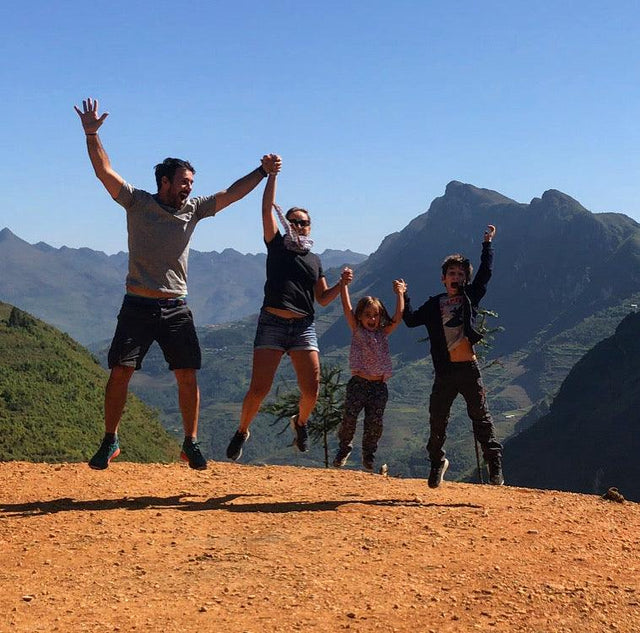Eco responsible travel - How to act as a family against oceans’ plastic pollution
SOLESSA - What's the goal ?
It’s the daring choice this surfer family took. Returning from a Balinese surf trip, they are shocked by the amount of plastic litter that strews the country. They, therefore, decide to travel to save and enhance coastal areas, seas, and oceans, through education and awareness of children about plastic pollution.
Their journey gives rise to a sharing of knowledge with local populations. Our responsible adventurers meet with plastic pollution specialists from all over the world. This original trip aims to produce a documentary report, where the main actors are children! Young people will thus be able to position themselves as a major player in the future of sustainable development. Support our travelers by following them live thanks to the Tracer on their website.
Here is their message from the end of the world:
How to choose the right time to leave? In relation to your respective jobs, knowing your children’s rhythm... What are the destinations? Why these? How long in total?
Aaaah the right time! Is there really such a good time? It’s like having a child, there’s never really THE right time… There are just planets that line up. As far as we are concerned, the lack of meaning in our respective professional activities, as well as a growing sensitivity to the future of our children and the current destruction of the planet which sees them growing up, were the determining factors in decision-making. Then, the children are still small, so school monitoring seemed easier to manage (that is what we thought before ...)
We started our trip with Sri Lanka, Vietnam, Philippines, Indonesia. Then, Australia, New Caledonia and New Zealand where we are now. Then we had to go to Tahiti, Hawaii, California and Costa Rica, but the planet asked us to stop traveling, to breathe.
Our destinations were chosen according to several criteria: The problems linked to the plastic pollution of their coasts, the actions put in place to stop this pollution, and of course the possibility of surfing on the spot! We left for a total of 10 months, the equivalent of a school year so as not to shift the children too much.
How is your report on plastic pollution going? Concerning the shooting, editing, etc.
Throughout the trip, we met committed people, carried out interviews, cleans up and awareness-raising actions. All of this serves as a basis for the documentary.
The past six months, and the beautiful places we have passed through, have allowed us to capture a great number of images as magnificent as alarming on the situation of our oceans.
Thanks to this lockdown period that we are currently undergoing, we have time to sort and choose the most impacting and sensitizing images. Our children, the narrators and main actors, will tell their stories and their experiences through the documentary.
Regarding the editing, we got in touch with Jérémi Stadler, French filmmaker, director of the superb documentary "Le Grand Saphir".
Are you satisfied with this project? Did you expect so much plastic pollution? How do the locals react?
We have opened this « life parenthesis » to give meaning to our actions. This project allows us today to be more committed. In addition, SOLESSA has allowed us to travel differently and meet great people who dedicate their lives to preserving oceans. SOLESSA is also the story of an adventure with our children, Solal and Tessa. They are our ambassadors to locals and children. We are very proud of them!
In general, plastic is everywhere, as far as you can get away from civilization you will find it on land as in the sea.
Local people have different reactions to this scourge. As Vikum, a Sri Lankan business owner, told us: "It's not that people are bad, it's just that they don't know, they don't realize the scope of their acts ”. He also stressed the priority that should be given to educate on this subject.
Priorities in the eastern countries are very different than our. Here, eating and having a roof over one's head is still an everyday struggle. An expatriate, living in Bali for more than 10 years, rightly explained to us that most of the locals live in the present moment, they don't think about tomorrow.
We have also found that in Asia the lack of resources to collect waste makes the situation even more difficult to manage.
In countries like Australia and New Zealand, the contrast is striking. Beaches are very clean, nature much more engaging. Many awareness-raising actions are in place. But here, the equation is simple, the number of animals far exceeds the number of humans ...
What are the best surf spots you visited and that you will recommend to your readers? And those most affected by pollution.
Each surf spot brings its share of magic. From this trip, I (Ben) would especially remember: Hiriketiya in Sri Lanka, Lembongan and Uluwatu in Bali but my El Dorado is in Siargao, in the Philippines.
Unfortunately, some spots are particularly affected by pollution such as Hiriketiya in Sri Lanka, where the runoff brings waste into the bay. Uluwatu is also threatened by plastic pollution linked to mass tourism like, unfortunately, all the Balinese spots.
The essentials for a trip like yours (accessories of all kinds), and What did you like about Saint Jacques?
If we have to talk about an essential accessory, it is the LifeStraw filtering bottle. Thanks to it we have excluded the problems linked to water, and, above all, we have saved more than 1344 plastic water bottles!
The Saint Jacques brand combines aesthetics, simplicity and comfort! And, it comes from the souuuuuuth!
Saint Jacques clothes have been put to the test ... These are the only T-shirts that you can wear three days in a row without being afraid that people will turn around on your way ... (because yes, around the world you don't take a shower every day!) In the water, with wetsuits or neoprene t-shirts (depending on the temperature ...) you feel a little pride in not looking like other riders!
What are the "original/responsible/reusable" products used by the cultures you met during your trip?
Here are some examples of products encountered during our trip: In Sri Lanka, we have found stainless steel or bamboo straws in all bars and restaurants. They are also sold over the counter in all the countries we have visited. Since then, we have our bamboo straws in the backpack, this allows us to refuse plastic straws! In Asia, the banana leaf is used as a packaging. In some places, the banana leaf replaces the polystyrene box for takeout dishes.
In the Philippines, at the auction of villages, are sold small cloth bags to put the fresh fish, which encourages the locals to reuse them.
In Australia, everyone has their own bottle, it has become the trendy accessory! In this country, we also saw for the first time a surfer taking the wave with a wooden board.
About Coronavirus, little news item. How are you affected by the virus?
Like everyone today, the COVID has had an impact on our lives, and therefore on our magnificent journey! To this day, we are still in New Zealand, confined, for an indefinite period. The New Zealand government has decided to stop all entry or exit from the territory (which also involves repatriation). We are not really in a hurry to return to France, this break allows us to slowly digest, with the children, the premature end of our trip around the world.
Your best moment vs. your worst moment of loneliness during this trip around the globe?
The best time for us will be our meeting with the whole Sulubaai Foundation team in their Pangatalan Sanctuary. The worst moment was when we separated in the Philippines because I (Oriane) had to return to France alone for family reasons.
A word to conclude?
A family trip around the world is above all a human adventure! Our family is united forever! With SOLESSA, this adventure has taken a more committed dimension! The cleans up on the beaches and the different meetings will be engraved forever! We think about Vikum (Salt house in Sri Lanka), Yann (Casa Vana in Sri Lanka), Fred (Sulubaai foundation in the Philippines), Thibault (Caledoclean in New Caledonia), Susie (Surfrider Foundation in Australia), Gale (SEA Movement in the Philippines), the teaching team and the students of the French School of Ho Chi Minh, Ben Benson (Surfer), Valentin (Bali Eco Deli in Bali), Pauline (Green Nido in the Philippines)… and all the children who brought us joy with their smiles, their enthusiasm and their implication for the future of OUR planet.
Thanks to Saint Jacques who supported the project from the start!


5 Comments
Une problématique qui mérite tout notre engagement. Quel plaisir de voir l’implication et la détermination que vous pouvez lui accorder. A quand le prochain le Trip ??? On vient avec vous. BRAVO !!!
Génial cet interview !
On comprend très bien le sens du projet Solessa ainsi que la situation alarmante autour de l’omniprésence du plastique sur notre planète.
Vous donnez envie aux gens, à nous, à moi de plus se responsabiliser, chacun à son échelle. C’est déjà une belle leçon!
Après pour des changements de plus grandes envergures il faudrait toucher le monde décisionnaire afin de mettre en place de réel changement…on se prend à rêver, à espérer que votre documentaire pourra avoir un impact de ce côté là!
L’engagement des enfants est aussi une clé géniale et tend à leur donner une perspective d´avenir avec un engagement écologique indispensable et même peut-être deviendront-ils des actionnaires du renouveau! Ce sont nos têtes pensantes de l’avenir comme vous le soulignez magnifiquement.
Un grand bravo à vous 4
Vous avez tout notre soutien et plus encore…!
Génial cet interview !
On comprend très bien le sens du projet Solessa ainsi que la situation alarmante autour de l’omniprésence du plastique sur notre planète.
Vous donnez envie aux gens, à nous, à moi de plus se responsabiliser, chacun à son échelle. C’est déjà une belle leçon!
Après pour des changements de plus grandes envergures il faudrait toucher le monde décisionnaire afin de mettre en place de réel changement…on se prend à rêver, à espérer que votre documentaire pourra avoir un impact de ce côté là!
L’engagement des enfants est aussi une clé géniale et tend à leur donner une perspective d´avenir avec un engagement écologique indispensable et même peut-être deviendront-ils des actionnaires majeurs avec des idées et des actions nouvelles, innovantes.
Ce sont nos futures têtes pensantes comme vous le soulignez magnifiquement.
Un grand bravo à vous 4!
Vous avez tout notre soutien et plus encore…
Il faut souligner aussi votre courage! Quitter un train de vie, déscolariser vos enfants pour essayer de vouloir transmettre un futur meilleur, lancer ce gigantesque « bouche à oreilles » virtuel à travers vos posts, vos vidéos et messages sur les réseaux!
On continuera de vous soutenir❤️
Cihan, Laurence, Ilhan & Enis
Quel beau voyage ! Quelle belle famille ! Super projet !!! Cela nous fait rever